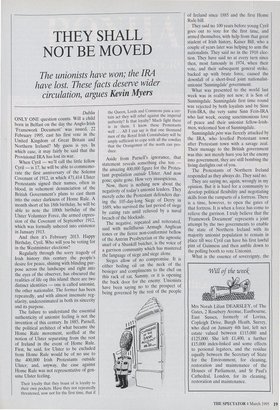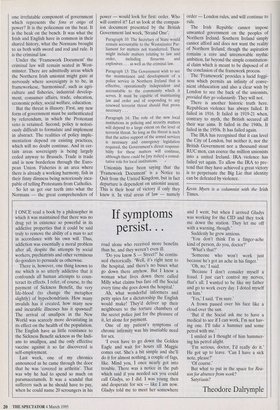THEY SHALL NOT BE MOVED
The unionists have won; the IRA have lost. These facts deserve wider
circulation, argues Kevin Myers Dublin ONLY ONE question counts. Will a child born in Belfast on the day the Anglo-Irish `Framework Document' was issued, 22 February 1995, cast his first vote in the United Kingdom of Great Britain and Northern Ireland? My guess is yes. In which case, it may fairly be said that the Provisional IRA has lost its war.
When Cyril — we'll call the little fellow
Cyril — is 17, he will be able to commemo- rate the first anniversary of the Solemn Covenant of 1912, in which 471,414 Ulster Protestants signed their names, often in blood, in vehement denunciation of the British Government's plans to cast them into the outer darkness of Home Rule. A month short of his 18th birthday, he will be able to note the 100th birthday of the Ulster Volunteer Force, the armed expres- sion of the Covenant of September 1912, which was formally ushered into existence in January 1913.
And then it's February 2013. Happy Birthday, Cyril. Who will you be voting for in the Westminster elections?
Regularly through the sorry tragedy of Irish history this century the people's desire for peace, shining with blinding pur- pose across the landscape and right into the eyes of the observer, has obscured the realities of life on this island: there are two distinct identities — one is called unionist, the other nationalist. The former has been repeatedly, and with almost insensate reg- ularity, underestimated in both its sincerity and its purpose. The failure to understand the essential authenticity of unionist feeling is not the invention of this century. In 1885, Parnell, the political architect of what became the Home Rule movement, scoffed at the notion of Ulster separating from the rest of Ireland in the event of Home Rule. First, he said, for Ulster to be excluded from Home Rule would be of no use to the 400,000 Irish Protestants outside Ulster; and, anyway, the case against Home Rule was not representative of gen- uine Ulster feeling.
Their loyalty that they boast of is loyalty to their own pockets. Have they not repeatedly threatened, now not for the first time, that if
the Queen, Lords and Commons pass a cer- tain act they will rebel against the imperial authority? Is that loyalty? Much fight there is in them. I know these Protestants well ... All I can say is that one thousand men of the Royal Irish Constabulary will be amply sufficient to cope with all the rowdies that the Orangemen of the north can pro- duce.
Aside from Parnell's ignorance, that statement reveals something else too the amazing 400,000 figure for the Protes- tant population outside Ulster. And now gone; quite gone. How very inauspicious.
Now, there is nothing new about the negativity of today's unionist leaders. They merely echo the Protestant defenders dur- ing the 105-day-long Siege of Derry in 1689, who survived the last period of siege by eating rats until relieved by a naval breach of the blockade.
The negative, repeated and reiterated, said with mellifluous Armagh Anglican tones or the fierce non-conformist bellow of the Antrim Presbyterian or the agnostic snarl of a Shankill butcher, is the voice of a garrison community which has mastered the language of siege and siege alone.
Sieges allow of no compromise. It is either boiling oil on the neck of the besieger and compliments to the chef on this rack of rat, Sammy, or it is opening the back door for the enemy. Unionists have been saying no to the prospect of being governed by the rest of the people of Ireland since 1885 and the first Home Rule bill.
They said no 100 years before young Cyril goes out to vote for the first time, and armed themselves, with help from that great student of Irish history, Kaiser Bill, who a couple of years later was helping to arm the nationalists. They said no in the 1918 elec- tion. They have said no at every turn since then, most famously in 1974, when their vote, and their subsequent general strike, backed up with brute force, caused the downfall of a short-lived joint nationalist- unionist `Sunningdale' government.
What was presented to the world last week was in reality not new; it is Son of Sunningdale. Sunningdale first time round was rejected by both loyalists and by Sinn Fein-IRA, the very same Sinn Fein-IRA who last week, oozing sanctimonious love of peace and their unionist fellow-Irish- men, welcomed Son of Sunningdale.
Sunningdalepere was fiercely attacked by the IRA, who levelled Protestant town after Protestant town with a savage zeal. Their message to the British government was this: not merely have you let the enemy into government, they are still bombing the living daylights out of you.
The Protestants of Northern Ireland responded as they always do. They said no.
They are saying no, again, wrongly in my opinion. But it is hard for a community to develop political flexibility and negotiating skills from the ramparts of a fortress. There is a time, however, to open the gates of that fortress. It is when a force has come to relieve the garrison. I truly believe that the `Framework Document' represents a joint attempt by the two governments to enable the state of Northern Ireland with its majority unionist population to remain in place till wee Cyril can have his first lawful pint of Guinness and then amble down to the polling booth to vote Unionist.
What is the essence of sovereignty, the
Will of the week
Mrs Norah Lilian DEARSLEY, of The Gates, 2 Rosebery Avenue, Eastbourne, East Sussex, formerly of Lorina, Copleigh Drive, Burgh Heath, Surrey, who died on January 4th last, left net estate valued between £115,000 and £125,000. She left £1,400, a further £15,000 index-linked and some effects to personal legatees, and the residue equally between the Secretary of State for the Environment, for cleaning, restoration and maintenance of the Houses of Parliament, and St Paul's Cathedral, London, for its cleaning, restoration and maintenance.
one irrefutable component of government which represents the fons et origo of power? It is the policeman on the beat. It is the beak on the bench. It was what the Irish and English have in common in their shared history, what the Normans brought to us both with sword and rod and rule. It is the criminal law.
Under the 'Framework Document' the criminal law will remain seated in West- minster. There are admittedly areas which the Northern Irish unionist might gaze at nervously where sovereignty is to be, in frameworkese, 'harmonised', such as agri- culture and fisheries, industrial develop- ment, consumer affairs, trade, education, economic policy, social welfare, education.
But the threat is illusory. First, any new form of government must be authenticated by referendum, in which the Protestant veto is retained. Second, policy is notori- ously difficult to formulate and implement in abstract. The realities of policy imple- mentation depend on existing practices, which will no doubt continue. And in cer- tain areas sovereignty is being largely ceded anyway to Brussels. Trade is trade and is now borderless through the Euro- pean Union. Fisheries is an area where there is already a working harmony, fish in their finny dimness being notoriously inca- pable of telling Protestants from Catholics.
So let us get our teeth into what the Normans — the great comprehenders of power — would look for first: order. Who will control it? Let us look at the compan- ion document presented by the British Government last week, 'Strand One'.
Paragraph 10: The Secretary of State would remain accountable to the Westminster Par- liament for matters not transferred. These might include matters relating to law and including order, and firearms explosives .. . as well as the criminal law.
Paragraph 13: The Government wish to see the maintenance and development of a police service in Northern Ireland that is effective, operationally independent and accountable to the community which it serves. It must be capable of maintaining law and order and of responding to any renewed terrorist threat should that prove necessary .
Paragraph 14: The role of the new local institutions in policing and security matters will depend to a large extent on the level of terrorist threat. So long as the threat is such that the active support of the armed services is necessary and emergency legislation required, the Government's direct responsi- bility for these matters will continue, although there could be ¶my italics] a consul- tative role for local institutions.
Unionists have been saying that the `Framework Document' is a Notice to Quit from the United Kingdom, but in fact departure is dependent on unionist assent. This is their hour of victory if only they knew it. In vital areas of law — namely order — London rules, and will continue to rule.
The Irish RepUblic cannot impose unwanted government on the peoples of Northern Ireland. Southern Ireland simply cannot afford and does not want the reality of Northern Ireland, though the aspiration remains a core and unremovable mythic ambition, far beyond the simple constitution- al claim which is meant to be disposed of at the conclusion of the framework process. The 'Framework' provides a lucid foggi- ness which permits an infinity of conve- nient obfuscation and also a clear wish by London to see the back of the unionists, provided they go voluntarily. They will not.
There is another historic truth here. Republican violence has always failed. It failed in 1916. It failed in 1919-21 when, contrary to myth, the British secured all their war aims. It failed in the 1940s. It failed in the 1950s. It has failed again.
The IRA has recognised that it can level the City of London, but neither it, nor the British Government nor a thousand stout RUC men, can coerce the million unionists into a united Ireland. IRA violence has failed yet again. To allow the IRA to pre- tend that they have achieved a great victory is to perpetuate the Big Lie that identity can be defeated by violence.
Kevin Myers is a columnist with the Irish Times.



























































 Previous page
Previous page